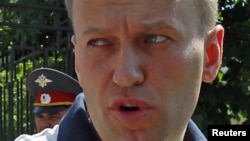MOSCOW — Prominent anti-Kremlin blogger Alexei Navalny has been charged with stealing state property from a government timber company in 2009. If convicted, he faces a 10 year prison term. Navalny has been a major force behind recent protests against Russian President Vladimir Putin.
A spokesman for the Investigative Committee, Vladimir Markin, explained the charges on state-run television.
He says that the investigation suggests that from May to September 2009, more than 10,000 cubic meters of timber belonging to the state was stolen. He says the theft amounted to more than 16 million rubles, or nearly $500,000.
Accusations denied
Navalny, a practicing lawyer in his 30's, says it is ridiculous the Kremlin is accusing him of stealing timber.
He says they now accuse me of stealing 16 million rubles and I can face up to ten years on these charges. This is a mega-strange thing. Even the very figure of 16 million rubles has not been explained at all.
The prosecutor’s office says the investigation focuses on events in 2009 when Navalny served as an advisor to the governor of the Kirov region. Prosecutors say that he worked with timber company officials to steal.
Navalny faced similar allegations in the past, but that case was closed earlier this year, due to a lack of evidence. He says this case is equally puzzling.
Navalny says he has been charged and ordered not to leave the city. Actually, he says, the whole thing is very absurd and very strange because they have completely changed the essence of the accusation, compared to what it was before.
New charges
The new charges leveled against Navalny carry a heavier sentence than the earlier charges that were dismissed.
The anti-corruption blogger spearheaded several unprecedented rallies against President Vladimir Putin. Hundreds of thousands of protesters came out to rally against the president. Demonstrators say he runs the country through a tightly controlled political system and corruption -- charges Mr. Putin denies.
Some analysts say the charges against Navalny are the Kremlin’s way of dealing with dissent.
The Russian parliament has passed a law that would increase fines significantly for those participating in and organizing unsanctioned protests. Some of the fines are much more than the average Russian earns in a year.
A spokesman for the Investigative Committee, Vladimir Markin, explained the charges on state-run television.
He says that the investigation suggests that from May to September 2009, more than 10,000 cubic meters of timber belonging to the state was stolen. He says the theft amounted to more than 16 million rubles, or nearly $500,000.
Accusations denied
Navalny, a practicing lawyer in his 30's, says it is ridiculous the Kremlin is accusing him of stealing timber.
He says they now accuse me of stealing 16 million rubles and I can face up to ten years on these charges. This is a mega-strange thing. Even the very figure of 16 million rubles has not been explained at all.
The prosecutor’s office says the investigation focuses on events in 2009 when Navalny served as an advisor to the governor of the Kirov region. Prosecutors say that he worked with timber company officials to steal.
Navalny faced similar allegations in the past, but that case was closed earlier this year, due to a lack of evidence. He says this case is equally puzzling.
Navalny says he has been charged and ordered not to leave the city. Actually, he says, the whole thing is very absurd and very strange because they have completely changed the essence of the accusation, compared to what it was before.
New charges
The new charges leveled against Navalny carry a heavier sentence than the earlier charges that were dismissed.
The anti-corruption blogger spearheaded several unprecedented rallies against President Vladimir Putin. Hundreds of thousands of protesters came out to rally against the president. Demonstrators say he runs the country through a tightly controlled political system and corruption -- charges Mr. Putin denies.
Some analysts say the charges against Navalny are the Kremlin’s way of dealing with dissent.
The Russian parliament has passed a law that would increase fines significantly for those participating in and organizing unsanctioned protests. Some of the fines are much more than the average Russian earns in a year.




